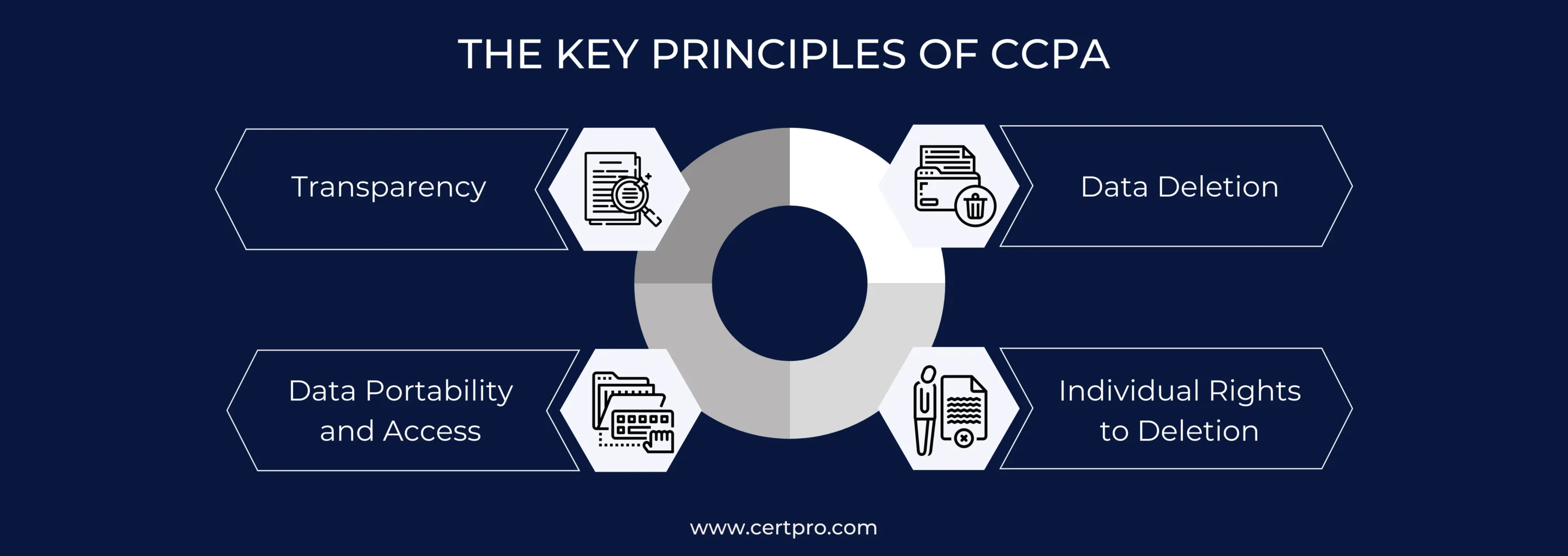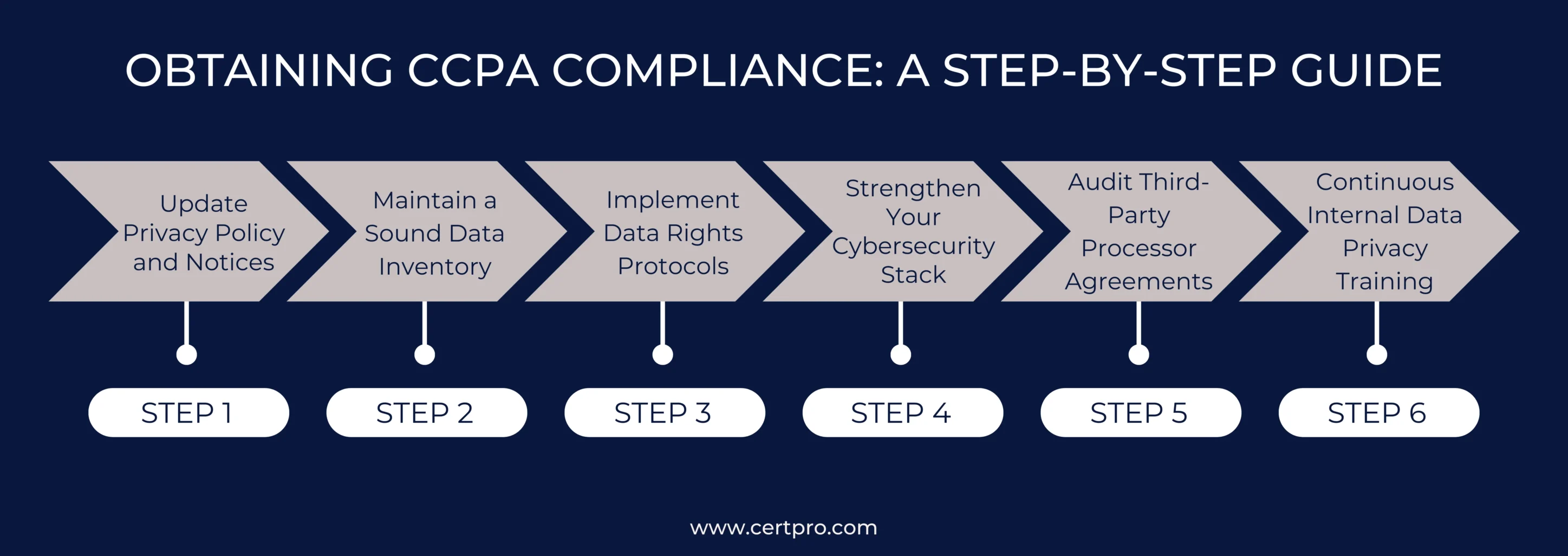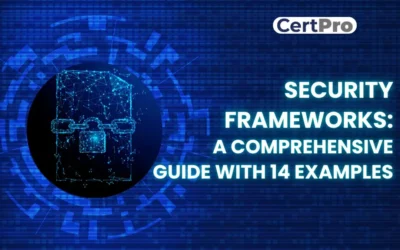CCPA
CALIFORNIA CONSUMER PRIVACY ACT
The California Consumer Privacy Act (CCPA) is a major data privacy law similar to the EU’s GDPR. First, the CCPA started on January 1, 2020. Then, enforcement began on July 1, 2020. As a result, it greatly impacted businesses worldwide. Next, the CCPA protects personal information. Specifically, it safeguards California residents’ data by setting strict rules. These rules cover data access, collection, and storage. Thus, businesses must handle data carefully.
Moreover, the CCPA gives consumers control. They can access their data, delete it, and opt out of data sales. Consequently, this empowers consumers and balances power between big and small businesses. In today’s world, data is vulnerable. Therefore, enhanced privacy is needed. The CCPA boosts privacy protections. It lets consumers control data use. Furthermore, it promotes transparency. Finally, it ensures accountability in data handling.

CERTIFICATION AND AUDITING SERVICES BY CERTPRO FOR CCPA
CertPro offers an affordable solution for CCPA compliance globally. We understand the importance of managing compliance costs. Therefore, we focus on providing only the necessary services and assessments for your company. This approach reduces unnecessary expenses. Moreover, we streamline the compliance process to use resources efficiently and minimize disruptions. Hence, CertPro’s cost-effective and efficient methods make CCPA certification affordable while maintaining high standards. Consequently, CertPro is a trusted partner for achieving CCPA compliance on a budget.
WHY CHOOSE CERTPRO FOR CCPA CERTIFICATION AND AUDITING?
CertPro is the best choice for CCPA compliance and audits for several reasons. First, our skilled staff offers specific help during the challenging compliance process. Moreover, we strictly follow data security and regulatory rules while focusing on your business needs. With CertPro’s proven track record, you can build credibility, reduce risks, and show your commitment to protecting client data. This sets you apart as a responsible and respected industry leader:
| Factors | CertPro Advantage |
|---|---|
| Time to Certification | 4x faster than traditional approaches |
| Price | Competitive rates with flexible options |
| Process | Streamlined and efficient methodology |
| Expertise | 10+ years of industry experience |
CERTPRO’S COST-EFFECTIVE APPROACH TO CCPA CERTIFICATION
CertPro provides a unique and affordable strategy for achieving CCPA compliance. We understand the resource constraints of compliance and tailor our services for efficiency and cost reduction. Our expert auditors focus on the essential areas specific to your organization, eliminating unnecessary steps and expenses. This ensures CCPA certification without financial strain. CertPro helps you protect client data, stay competitive, and meet compliance goals while managing costs responsibly:
| No. of employees | Timeline | Cost (approx.) |
| 1 – 25 | 4 weeks | 2500 USD |
| 25-100 | 6 weeks | 3500 USD |
| 100-250 | 6-8 weeks | 5000 USD |
| 250 plus | 8 weeks | Custom plans |
UNDERSTANDING THE CALIFORNIA CONSUMER PRIVACY ACT (CCPA)
The California Consumer Privacy Act (CCPA) is a comprehensive privacy law that improves consumers’ rights regarding personal data and focuses specifically on companies’ gathering and selling of data. The CCPA grants several rights to consumers. It permits the customers to know about how their data is accessed. The customer can then ask for this material to be corrected or deleted. They must also be given clear notifications about the information companies gather about them. Section 1798.140 of the CCPA mandates businesses to disclose their purposes. Companies must determine and share their business or commercial purposes. Under the CCPA Business Purpose, using personal information is allowed. However, it must be for operational or notification purposes and must be necessary and proportionate.
The CCPA lists seven business purposes. These include auditing interactions with consumers, debugging and repair, and security. Other purposes are short-term uses, tech development research, performing services, and quality and safety verification. The law also recognizes various services provided by businesses. These include account maintenance, customer service, and order processing. Other services are customer information verification, payment processing, and financing. Additionally, advertising, marketing, analytics, and similar services are included. CCPA’s commercial purpose relates to economic interests. It involves facilitating transactions or exchanges of products and services. However, it does not include noncommercial speech like political speech and journalism. There is no specific list of commercial purposes, and the line between commercial and business purposes can be unclear. Due to broad definitions, they often overlap. Understanding these definitions is essential. They help define business entities, service providers, and third parties under the CCPA.
THE KEY PRINCIPLES OF CCPA
The CCPA principles safeguard privacy and empower consumers. They establish accountability and promote responsible data handling. The main principles are:
Transparency: Companies need to give customers clear information. This covers the types of personal data gathered, used, and distributed to outside parties. This data ought to be updated annually and included in the privacy policy.
Data Deletion: Businesses must handle deletion requests. They must also pass these requests on to their service providers. Service providers face potential penalties under the CCPA for non-compliance.
Data Portability and Access: Under the CCPA, customers are granted rights to access and data portability. Businesses can seek personal information from their customers. This covers particular bits and subsets of information gathered and disseminated to outside parties. Customers can get their data in a format that makes it simple to transfer to another institution. Companies have 45 days to reply to these inquiries.
Individual Rights to Deletion: Consumers can request the deletion of their personal information, and businesses must comply with these requests.
These principles ensure consumers’ control over their data and help businesses handle data responsibly.

RIGHTS UNDER THE CCPA
The California Consumer Privacy Act of 2018 (CCPA) gives consumers more control over their personal information. It has rules to help with compliance. This law provides new privacy rights for California consumers. These rights include:
Right to Know: Consumers can learn how businesses collect, use, and share their personal information.
Right to Deletion: Consumers can ask businesses to delete their personal information, with some exceptions.
Right to Opt-Out: Consumers can decide if businesses can sell or share their personal information. As a result, this helps protect their privacy.
Right to Non-discriminatory Treatment: Consumers are protected from discrimination when they use their CCPA rights. They are treated equally, no matter their privacy choices. Following voter approval of Proposition 24 in November 2020, the California Privacy Rights Act (CPRA) amended the CCPA and introduced additional privacy protections. Effective January 1, 2023, consumers now have more distant rights beyond those mentioned above, including:
Right to Correct: Customers can request that companies update any errors in their data. Therefore, accuracy is guaranteed by doing this.
Right to Limit the Use: Consumers can restrict how businesses use and share their sensitive personal information, which gives them more privacy and control.

OBTAINING CCPA COMPLIANCE: A STEP-BY-STEP GUIDE
Follow the six steps outlined below to understand the process of achieving CCPA compliance.
Step 1: Update Privacy Policy and Notices
Begin by reviewing your existing privacy policy and conducting a CCPA gap assessment. Update the policy to incorporate the new rights and requirements outlined in the CCPA. Assure that your revised privacy policy clearly outlines procedures for granting these rights under different circumstances. Additionally, make necessary updates to the privacy notices provided to consumers, offering more detailed information regarding the use and processing of their data at the point of data collection.
Step 2: Maintain a Sound Data Inventory
To ensure CCPA certification, maintain a thorough data inventory that tracks all information processing activities. This inventory should encompass your business processes, products, devices, and software to handle consumer data. Classify the data according to CCPA requirements, identifying data types sold, shared with third parties, or used for marketing purposes. Additionally, record any rights requests related to specific data types in the inventory as evidence of your CCPA compliance efforts.
Step 3: Implement Data Rights Protocols
Ensure the new consumer data rights from the CCPA are central to your compliance. Create processes to handle consumer requests. For example, if a consumer uses their right to be forgotten, your IT team should know where the data is and have a process to delete it. Then, the consumer will be notified according to CCPA rules. Prepare these protocols in advance for smooth and compliant handling of requests.
Step 4: Strengthen Your Cybersecurity Stack
The CCPA requires businesses to have “reasonable” security measures. Start by assessing the risks to different types of data. Focus on the areas most at risk and improve systems accordingly. Investing in solid security for high-risk data may cost more initially. However, not taking action could lead to significant fines if a breach occurs. Therefore, data protection should be prioritized to reduce risks and follow CCPA rules.
Step 5: Audit Third-Party Processor Agreements
If your organization engages in collaborative arrangements with external entities for consumer data processing, storage, or transmission, it is crucial to audit and update those contracts for CCPA compliance. Partnering with a knowledgeable CCPA compliance expert can simplify this process by incorporating standard contractual language into your agreements, minimizing legal complexities. Ensure that your contracts address all aspects of CCPA compliance, including third-party data processing and collaboration on data rights requests.
Step 6: Continuous Internal Data Privacy Training
The CCPA requires organizations to provide training to individuals involved in consumer data handling, particularly those processing data rights requests. Training methods can include on-site classroom sessions, live virtual training, or standardized courses with materials and assessments. While the CCPA does not specify training frequency, it is advisable to conduct annual refresher sessions to ensure ongoing awareness and compliance.

CCPA COMPLIANCE REQUIREMENTS
The CCPA compliance requirements are structured to align with consumer rights over their data and encompass the following specific obligations for companies:
- Process Inventory for Data Subject Access Requests, including the Right to Know: Develop comprehensive workflows that provide visibility into the processes and activities connecting physical systems to data categories, purposes, and third-party sharing. It facilitates a transparent data flow, enabling efficient identification and evaluation of requested data.
- Right to Opt-Out of Sales: Match opt-out requests obtained from feeder systems with the reliable profile of an individual and their associated data, regardless of their location within the organization. Conduct data subject access request (DSAR) discovery reports to identify where the individual uses the data.
- Right to Access Data: Streamline access requests by leveraging real-time insights on an individual’s relevant personal data, allowing for swift data matching with its intended purpose.
- Right to Deletion: Eliminate personally identifiable information from systems through remediation, employing deletion workflows. Utilize validation capabilities to evaluate data compliance with retention policies and establish an audit trail to confirm the removal or deidentification of the data.
5. Data Privacy Protection: Automate the deployment of data security controls to mask personal data, ensuring protection against unauthorized access and monitoring for suspicious activities. Comply with data anonymization requirements by de-identifying data without impeding business operations.
BENEFITS OF CCPA COMPLIANCE
The benefits of CCPA compliance are as follows:
Easier Data Management: The CCPA offers several benefits for Easier, more affordable, and more scalable data management. Businesses can securely store, analyze, and derive insights from large volumes of data cost-effectively, leading to improved performance, reduced expenses, and the ability to leverage predictive analytics.
Enhanced Restricted Data Governance: The CCPA provides benefits in terms of improved governance of restricted data. Businesses can map their data to critical data elements, enabling effective validation and customization of workflows to ensure ongoing CCPA compliance even as the law evolves continuously.
Improved Customer Loyalty: The CCPA offers the advantage of enhanced customer loyalty. By anticipating customer needs and developing a strategic communication plan, businesses can effectively engage with customers, keeping their brand in mind. Well-timed and informative communications are essential to building and nurturing ongoing customer relationships and fostering loyalty and trust.
Operationalize Regulatory Policies: The CCPA enables businesses to operationalize regulatory policies by establishing a centralized location. It includes defining and documenting policy, controls, governance processes, critical data elements, categories of data, subcategories, and data quality rules.
Mitigate Compliance Risk: The CCPA allows businesses to reduce compliance risk by effectively monitoring risk reports. By tracking and analyzing data risk, organizations can identify potential issues and take proactive measures to mitigate the business impact associated with non-compliance.
THE COST OF CCPA COMPLIANCE
Complying with the California Consumer Privacy Act (CCPA) entails various costs that businesses must consider. The following four main cost categories, outlined in the Attorney General’s report, highlight the financial implications of CCPA compliance:
- Legal Costs: Businesses need legal counsel to assess the CCPA’s impact on their technical and operational plans, providing personalized interpretations of the law for their specific circumstances.
- Operational Costs: Establishing non-technical infrastructure and procedures to handle compliance obligations is necessary to meet CCPA requirements effectively.
- Technical Costs: Implementing technologies capable of handling consumer requests and incorporating features like an opt-out button on the website, primarily if the business sells personal information (PI), can incur expenses.
- Business Costs: CCPA may necessitate businesses to modify their existing business models and renegotiate agreements with service providers to ensure compliance with the privacy requirements.
Organizations differ in the precise costs of compliance. The Attorney General’s report does, however, provide an estimate. Roughly 75% of California companies will have to abide by the rules, which will cost about $55 billion in expenses. This sum represents 1.8% of California’s 2018 GDP. Businesses must thus evaluate these expenses and distribute resources appropriately, guaranteeing CCPA compliance.
CERTPRO’s ASSISTANCE IN CCPA COMPLIANCE
CertPro helps your business achieve CCPA compliance with comprehensive auditing and consulting services. As a result, our experienced professionals will assess your data protection practices. Consequently, they identify gaps and guide necessary measures. Therefore, we help you align with CCPA regulations. Furthermore, we assist in developing and implementing privacy policies. We also help with procedures and controls. Moreover, we conduct data protection impact assessments. As a result, partnering with CertPro enhances your ability to protect consumer privacy.
Consequently, you can mitigate risks and commit to consumer data privacy rights. CertPro’s services help you navigate CCPA compliance complexities. Therefore, you can foster trust with consumers. Overall, CertPro ensures your organization meets the required standards for handling personal information under CCPA regulations.
FAQ’s
WHAT ARE THE PENALTIES FOR NON-COMPLIANCE WITH CCPA?
Non-compliance with the CCPA can result in significant penalties. In the event of a data breach or violation, the California Attorney General can impose fines ranging from $2,500 to $7,500 per violation. Consumers also have the right to file private lawsuits, leading to potential statutory damages.
WHAT IS THE VALIDITY PERIOD OF CCPA COMPLIANCE?
CCPA compliance is an ongoing obligation for businesses that collect and process the personal information of California residents. There is no specific validity period mentioned in the CCPA. Organizations should maintain compliance as long as they handle personal data and operate within the scope of CCPA requirements.
IS CCPA COMPLIANCE ONLY REQUIRED FOR BUSINESS LOCATED IN CALIFORNIA?
No, CCPA compliance is not limited to businesses located in California. The CCPA applies to organizations that collect and process the personal information of California residents, regardless of the business’s physical location. If a company outside of California handles the personal information of Californians, it is still required to comply with the CCPA.
DOES CCPA COMPLIANCE IMPOSE ADDITIONAL COSTS ON SMALL BUSINESS?
CCPA compliance can impose financial burdens on smaller businesses that may not have the same resources as larger companies. However, the law aims to level the playing field by requiring all businesses to comply with the same standards, regardless of size.
CAN COMPLIANCE WITH THE CCPA HELP TO IMPROVE DATA PRIVACY AND CONSUMER TRUST?
Yes, CCPA compliance helps businesses handle personal data responsibly and gives consumers greater control over their information. By demonstrating compliance, organizations can enhance data privacy practices, build trust with consumers, and mitigate reputational and legal risks.
NAVIGATING DATA PRIVACY FRAMEWORKS: A COMPREHENSIVE GUIDE
Globalization has intense effects on business functioning and scaling. In today's digital world, companies are generating an unprecedented rate of data that requires protection from emerging cyber threats. In addition, recurring data breaches and privacy concerns make...
BUSINESS NON-COMPLIANCE: THE HIDDEN FINANCIAL AND OPERATIONAL COSTS
Businesses are always in a dilemma regarding whether or not to be compliant. Most companies think that compliance will problematize their operating process. However, highly regulated industries like financial and healthcare services meet the legal obligations for...
Security Frameworks: A Comprehensive Guide with 14 Examples
Technological advancements make cyberattacks more sophisticated and advanced. Hence, organizations must keep up with the latest cybersecurity frameworks in these complicated scenarios to sustain themselves in a dynamic threat environment. Different cybersecurity...
























